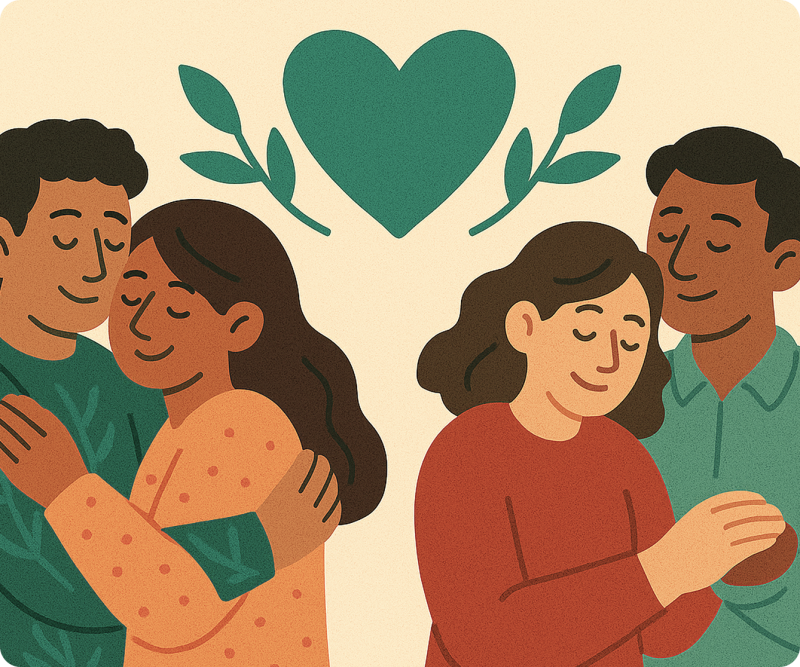
Developing Communication & Assertiveness Skills
We all communicate every day, but effective communication and assertiveness are skills that don’t always come naturally. Many people struggle with expressing their needs, setting boundaries, or navigating difficult conversations without feeling overwhelmed or misunderstood.
Communication and assertiveness challenges can impact every area of life—from personal relationships and workplace dynamics to self-esteem and overall wellbeing. If you find yourself avoiding conflict, people-pleasing, or struggling to have your voice heard, you’re not alone and these skills can be learned.
Common Communication & Assertiveness Challenges
Everyone’s communication style is different, but common difficulties may include:
- Difficulty expressing needs, wants, or opinions clearly
- Fear of conflict or confrontation leading to avoidance
- People-pleasing behaviours at the expense of your own needs
- Struggling to set healthy boundaries with others
- Feeling unheard or misunderstood in conversations
- Difficulty saying “no” without feeling guilty
- Aggressive communication that damages relationships
- Passive communication that leaves you feeling frustrated or resentful
- Social anxiety affecting your ability to speak up
- Trouble navigating workplace discussions or negotiations
If these challenges sound familiar, developing stronger communication and assertiveness skills can significantly improve your relationships and confidence.
What Affects Communication & Assertiveness?
Communication patterns are often influenced by various factors, including:
- Early family dynamics and childhood experiences
- Cultural background and societal expectations
- Past experiences with conflict or criticism
- Low self-esteem or lack of confidence
- Anxiety or fear of rejection
- Learned behaviours from role models
- Gender socialisation and cultural norms
- Previous negative experiences with speaking up
- Perfectionism or fear of making mistakes
Understanding these influences can help you recognise patterns and work toward more effective communication styles.
Developing Better Communication & Assertiveness
The encouraging news is that communication and assertiveness are learnable skills. At Seed Psychology, our experienced psychologists use evidence-based approaches including Cognitive Behavioural Therapy (CBT) and assertiveness training to help clients develop confident communication skills.
Therapy can help you:
- Learn the difference between passive, aggressive, and assertive communication
- Develop skills to express your needs and boundaries clearly
- Build confidence in difficult conversations
- Practice active listening and empathetic communication
- Overcome social anxiety that impacts communication
- Develop conflict resolution and negotiation skills
- Strengthen your sense of self-worth and personal values
- Create healthier relationship patterns
Through practice and support, you can develop a communication style that feels authentic, respectful, and effective.
Transform Your Relationships Through Better Communication
Effective communication and assertiveness skills can transform your personal and professional relationships, boost your self-confidence, and help you create the life you want.
Our skilled team at Seed Psychology is here to support you in developing these essential life skills. We provide practical strategies and ongoing support to help you communicate with clarity, confidence, and compassion.
Connect with us to book an appointment with a psychologist in our Brunswick clinic or via telehealth Australia-wide.
Through connection,
change is possible
Our compassionate team at Seed Psychology is here to help you regain your wellbeing and navigate life’s challenges with greater confidence and clarity. Connect with us to book an appointment with a psychologist in our Brunswick clinic or via telehealth Australia-wide.
Available resources
Meet our amazing team of therapists
Our diverse team of psychologists offer individual, couples, and online therapy, as well as assessments. Beyond their expertise, they bring humanity and care, providing respectful, affirming support tailored to each person’s unique experience.
Freqeuently asked questions
-
Therapy is a shared process. While your Psychologist brings expertise, insight, and support, the most meaningful outcomes often come when you’re actively engaged in your own growth. This means being open and honest during sessions, reflecting between appointments, and being willing to try new approaches-even when it feels challenging. Therapy can take time, and progress isn’t always linear, but your commitment matters. Here are some ways to support your journey:
- Be open and honest with your Psychologist, even (and especially) if something feels hard to say.
- Give feedback if something doesn’t feel right or if your needs change.
- Stay open to exploring new ideas and practices within a safe, supportive space.
- Take notes or keep a journal to reflect on insights or patterns between sessions.
- Try to attend regularly-consistency is key to building momentum.
- Be kind to yourself. Growth can be uncomfortable at times, but that doesn’t mean you’re doing it wrong.
- Invest in your wellbeing outside of therapy by building habits and routines that nourish you.
Therapy is a courageous act of self-investment. By showing up and staying engaged, you create space for real and lasting change.
-
Our experienced team of Psychologists offers warm, evidence-based support that’s collaborative, inclusive and grounded in genuine understanding. We provide individual, relationship or family therapy for a wide range of concerns. Additionally, we offer couples therapy, online therapy, psychological assessments (including ADHD and Autism Spectrum Assessments), and workshops.
-
There’s no one-size-fits-all answer to how long therapy takes. At Seed Psychology, we tailor each intervention to your individual needs, goals, and circumstances. Some people come to therapy to navigate a specific challenge, like managing anxiety, adjusting to a life transition, or processing a relationship difficulty. Others may be seeking deeper emotional growth or support for longer-term concerns. Because of this, the number of sessions can vary. Many clients attend between 6 and 18 sessions, though some need fewer and others continue for longer. Your Psychologist will discuss an estimated treatment plan with you after your initial assessment and continue checking in over time to ensure it feels helpful and aligned with your goals. Ultimately, the pace and duration of therapy is something we navigate together, guided by your progress, preferences, and what feels right for you.
-
Consultations with a psychologist last between 50 and 60 minutes.
-
At Seed Psychology, your safety and wellbeing are our highest priorities. While we are here to support you through regular therapy sessions, we are not a crisis service and may not be available outside of scheduled appointments. If you or someone you care about is in immediate danger, experiencing a mental health crisis, or needs urgent support, it’s important to seek help straight away through the appropriate emergency or crisis services. You can find a list of trusted organisations and services here that can provide immediate support when you need it most.








